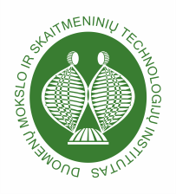Research agenda
| Key tasks |
| 1. A systematic analysis of global research on propaganda and disinformation (PD) |
| 2. Data collection and PD* text generation |
| 3. Linguistic analysis of text data |
| 4. Annotating PD techniques for text data |
| 5. Hybrid machine learning for automatic recognition of PD features |
| 6. Developing a software tool |
| 7. Analysis of options for research on the social impact of PD |
| 8. Exploring the possibilities of modelling PD social networking |
| 9. Investigating the determinants of PD prevention and resilience of societal groups, with recommendations |
Activities
1.1 Review and analysis of global research
1.2 Selection of the research methodology
2.1 Selecting the criteria for text composition
2.2. Design of the sampling methodology
2.3 Selecting and listing potential sources
2.4. drafting of PD texts in Lithuanian
2.5 Designing a text-based publicity tool
3.1. Manual analysis using critical discourse analysis and pragmatics approaches (identifying argumentation strategies)
3.2 Automated analysis using computational linguistics methods (text processing, e.g. AntConc software for frequency word lists, n-gram lists, concordance strings, collocates analysis)
3.3 Designing a tool for visualising the results of linguistic analysis
4.1 Selection of the propaganda techniques to be investigated
4.2 Selecting the annotation tool(s)
4.3. Annotating texts by expert questioning
5.1 Analysis of the applicability of deep learning BERT, GPT, LSTM, CRM and other hybrid approaches to automatic text mining for the detection of PD techniques
5.2. Detection of PD techniques
5.3. Sentiment analysis of PD texts
5.4 Testing and validation of results
5.5 Analysis of consumer characteristics to identify variables that may assess the propensity of consumers to participate in the dissemination of PD.
5.6. analysis of PD dispersion to identify the characteristics of PD dispersion.
6.1 Design of a reference decision support tool for automatic detection of PD
6.2 Development of a software tool for automatic analysis and assessment of PD
7.1. PD impact metrics study: survey and network analysis study
7.2 Exploring the potential impact of PD on social capital
8.1 Analysis of the prevalence and application of PD techniques
8.2 Exploring the potential of modelling PD information bubble clusters
8.3 Exploring the possibilities of modelling radicalisation and polarisation of social groups
9.1. research and recommendations on the feasibility of analysing the sources (authors/bots) and dissemination of PD
9.2 Investigating the potential to prevent the spread of PD and resistance factors
9.3 Recommendations for the use of digital technologies to enhance the resilience of PDs and to prevent their impact in crisis situations of information warfare.
